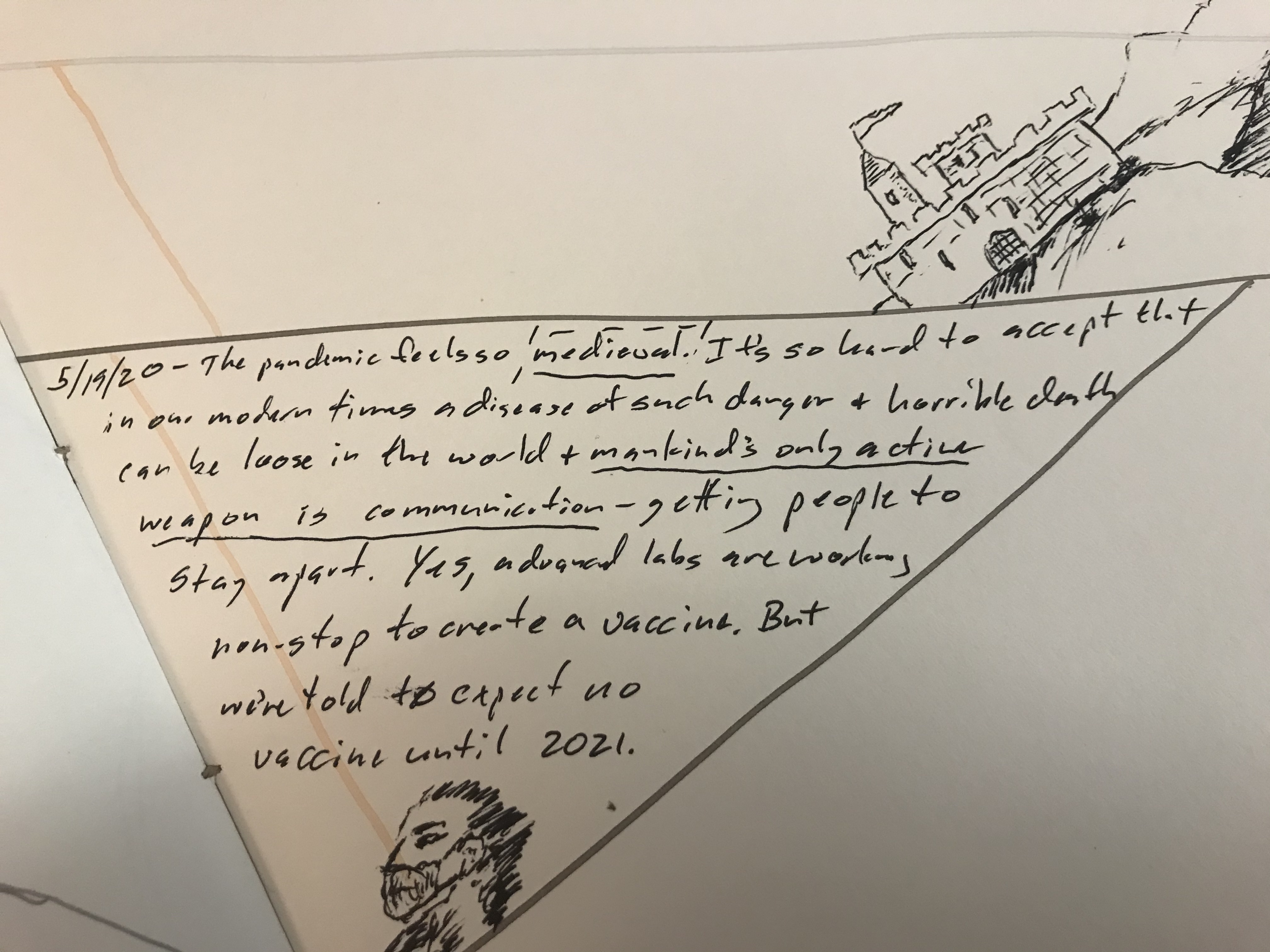
Saved by Communication — More In-depth Discussion

On Tuesday I wrote the following my sketchbook:
The Pandemic feels so medieval. It’s hard to accept that in our modern times, a disease of such danger and horrible death can be loose in the world AND that mankind’s only active weapon against it is communication.
With this thought hovering in my mind, I was struck by this morning’s Rory Sutherland article in the Spectator about how behavior change has been mankind’s weapon to fight the spread of the Corona Virus.
Our joint thoughts arrive at truth:
The world is being saved by communication which changes behavior.
Take a deep breath now and read that line several times.
 For all our technology, for all our venture capital funded breathless superiority, for all our massive investments in medicine, for all the hard work in regulations and laws of our governments, the fate of humanity is being shifted by communication leading to behavior change — a result which will save tens of millions of lives — if not hundreds of millions.
For all our technology, for all our venture capital funded breathless superiority, for all our massive investments in medicine, for all the hard work in regulations and laws of our governments, the fate of humanity is being shifted by communication leading to behavior change — a result which will save tens of millions of lives — if not hundreds of millions.
For all our ability to see the shape of the virus, to analyze it’s RNA, to establish GPS tracking of victims, to build and crunch massive data sets, getting people to live their lives wisely is our best response.
For all of social media’s sturm und drang, for all the “patriots” carrying heavy weaponry at state houses, for all our need for groups of humanity, clear, consistent messages have come through to the vast majority of humanity and we have done well with those messages…so far.
Why does the world struggle to believe that communication is the starting point of all true power — at least the world of CEOs, engineers, technical marketers, accountants, manufacturing specialists and HR? And how would we train ourselves differently if we understood that individual and mass communication are the foundation of a world which both survives and thrives?
Power is More Vague Than We Like to Admit
Throughout history, and today is no exception, people confuse busy-ness with power. Our lives and our companies have become filled with how busy-ness leads to promotions and that leads to higher pay. We had come to believe that power was created by being busy — by “hustle” if you listen to some self-styled hustle gurus. And it’s not just in business. Politicians are given more credit for “doing something” than for governing wisely. The wisest governance may mean primarily listening and communicating.
An atom bomb is considered power because it awes us — we can see what it does and we are humbled by it. We are also confused by an office with “power”. A politician winning the presidency thinks they have power. Then they discover that they have been temporarily been granted an office from which the appearance of power emanates. They can also gain power if they…communicate well. Frustrated by this, an unwitting occupant might just invent conspiracy theories. What they should do is accept what’s always true in leadership: you are granted power by those you lead. End of story.
Amid our incredible confusion about power, what has communication caused? Over a billion people have made drastic changes to their lives in the span of a few months including willingly entering a time of uncertainty with steps which hurt their short-term economic well-being.
Creating a company valued at billions of dollars? Chump change. Saving the lives of a few hundred million people? Priceless.
Bureaucracy is Not Power
In his article, Rory Sutherland points out that the vast majority of behavior change we’ve seen has been voluntary. Imagine — communication led people to drastically change their lives because they were given appropriate information on which they could base their own choices. No company had to make the choice for them. No department head had to “keep his department in line.”
Perhaps even more challenging, the vast expanse of behavior change happened before laws were in place which required it. My sense is the laws were critical — but as as the force needed for the last 20% of change. The majority of change happened without them.
For a thought provoking read, this New Yorker article about the California town of Bolinas mounting it’s own testing project is interesting.
Paternalism isn’t Effective with People. Mostly It Helps Leaders Feel Safe
Part of where both business and society gets hung up starts with parents who believe they can control the formation of their children (ain’t gonna happen). Or who demand absolute obedience (ain’t gonna happen). The truth is that kids are always smarter and think clearer than we know — but we rarely notice because we are so busy telling ourselves they don’t know anything.
When it comes to it, corporations are just as guilty of bureaucratic paternalism as governments — and conservatives drive for as much paternalism as liberals. The issue is always a presumption that people can’t make their own decisions.
The truth? People do quite well making decisions when they have been informed well. Communication DOES have impact. I’ve come to believe the role of both rules and laws are to help guide and point people — they are only effective when people see their wisdom and add that “advice” into their actions. This effectiveness, then, is enhanced by enforcement of the laws — but the laws have to be societally accepted before that can really happen.
So Communication, and the Behavior that Results, Ends Up Our Most Powerful Weapon
I know what you’re going to say: We’ve had 6 months of chaotic, inconsistent communication — not the least bit like highly organized business advertising and communication.
You’d be half right saying this. We HAVE had 6 months of chaotic and inconsistent communication. But let’s not exaggerate how well organized business communication is. Businesses convince themselves it’s orderly. On the field of battle, it’s not anywhere near as orderly as we might think.
Earlier this week I released a blog post about “consumer journey” — and the most important truth to learn from it is the powerful presence of randomness in organized communication efforts. Even your highly regimented campaign ends up being far more chaotic in the mind of a customer.
Even more, companies fail to get a true picture of their work from a customer point of view. It’s chaos out there. After all your search for perfection, many customers choose to purchase after reading reviews on B-grade blogs with out of focus smartphone photos of your product. While you believe you painted a pretty picture, customer lives encounter a cluttered collage and, at most, only half of the messages come from your company.
Communication is always chaotic. While this could have been better, it’s not terribly different.
None of this Diminishes the Heroic Efforts of Those Directly Fighting the Virus and It’s Impact
I want to be clear, there is tremendous effort across the world fighting this damned virus — often at considerable personal risk. All who are working so hard to find treatments, vaccines, and other solutions deserve our honor.
And, of course, tremendous honor is due the doctors, nurses, aides, paramedics and other workers who are testing, taking in, treating, and too often being the last human face seen by someone who dies of Covid. My heart droops merely by writing that last statement — it is incredibly sad.
Yet it is on behalf of ALL these people who are working with so much humanity, humility, and dedication that we need to recognize the power of communication. All of their work is for naught if the society-wide communication and behavior change don’t happen.
Yet, Still, The Truth Came Through — It Communicated
Given the chaos of the past 6 months, we should take hope for the fact that the truth came through. Yes, there was a fight in the American White House and at 10 Downing Street about what to say — so their communication was quite often inconsistent, cluttered, and powerless.
People listen when their lives are on the line — they cared deeply about what was being said. And, so, the quiet certitude of American Drs. Fauci and Birx remained in the front of their minds. Wise emanations from the CDC and WHO reported in various news outlets were heard and had impact. And the articles citizens encountered, as well as conversations among friends and acquaintances, helped build consistent changes to behavior across the world.
This IS the way communication happens. It’s messy. It’s difficult. The communicator rarely feels in full control of the situation. Yet consistent messages can make it through the blur of chaos over a series of months. It did this time so that behavior changed and people survived. (From what I read, tens of thousands more survived in just the past 2 months.)
What I hope going forward is that we never forget this lesson: Of all the things we do, communication is usually the most powerful.
©2020 Doug Garnett — All Rights Reserved
Through my company Protonik LLC based in Portland Oregon, I consult with companies on their efforts around new and innovative products and explore what marketers should learn from the field of complexity science. An adjunct instructor are Portland State University, I also teach marketing, consumer behavior, and advertising.
As a specialty, I also advise a select group of clients attempting to bring new life to Shelf Potatoes or taking existing products to new markets. You can read more about these services and my unusual background (math, aerospace, supercomputers, consumer goods & national TV ads) at www.Protonik.net.
Categories: Business and Strategy
